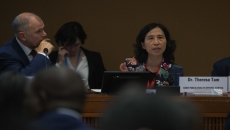Canada's national police force wants a digital tool to harvest data from a sweeping variety of online sources, including the darkest reaches of the internet, to provide early information on threats such as disease outbreaks and mass shootings. The software would allow an RCMP officer to quickly mine data about a person's internet activities, from an emoji posting on Facebook to an illicit firearm purchase on the so-called darknet.
"Social media and publicly available information will be used to identify threats and address public concerns," says the RCMP contract tender. The application would also help spot brewing public-relations issues "and enhance strategic, operational and tactical information for improved decision-making in a crisis or major-event setting."
The tender says the tool should include a dashboard with reports on breaking news, mass-casualty events, terrorist attacks, disease outbreaks and natural disasters. The solicitation notice was issued in mid-April, just days before a gunman went on a deadly rampage in Nova Scotia. However, the initiative is rooted in another tragedy, the fatal shootings of three police officers and the woundings of two others in Moncton, N.B., six years ago.
A report on the events recommended the RCMP procure a real-time social-media monitoring tool to help identify risks and improve public communication, noted Cpl. Caroline Duval, an RCMP spokeswoman.
"The police must keep pace with the emergence of new technologies to best serve their communities," Duval said. "Social-media analysis can support public safety in a variety of ways."
The RCMP already uses such information to detect threats to major events, infrastructure or other locations, she said. It has also helped identify dangers to public figures and prevent suicides, school shootings and other criminal actions discussed on social media, Duval added.
Such trawling of open-source material by the Mounties has also raised privacy questions.
A Toronto activist concerned about mining-industry abuses recently learned the Mounties compiled a six-page profile of her shortly after she showed up at a federal leaders debate during the 2015 election campaign.
Rachel Small, an organizer with the Mining Injustice Solidarity Network, said it was "kind of creepy and unsettling" to see the RCMP profile, which came to light years later through an access-to-information request.
The new software tool would sift publicly available Internet data sources and content including, but not limited to, Twitter, Facebook, blogs, chatrooms, message boards, social networks, and video and image-sharing websites.
The tender suggests the tool have a broach reach, capable of turning up data from cyberspots such as deal-shopping site Groupon and gaming platform Farmville.
It would also delve into content found in less visible segments of the internet, the deep web and darknet, that can elude commonly used search engines.
The new tool would complement the RCMP's existing Social Studio software, used in a social media monitoring project known as Wide Awake that is designed to zero in on threats by flagging key words.
The RCMP's efforts to divine useful information from social media have sparked discussions with the federal privacy commissioner, said Vito Pilieci, a spokesman for the ombudsman.
The commissioner's office has highlighted the need for the RCMP to be transparent with the public about its social-media monitoring activities and the importance of a privacy impact assessment, a formal analysis of the risks to personal information, Pilieci said.
The RCMP has demonstrated the Social Studio software for the commissioner's office, Duval said.
The police force is finalizing a privacy impact assessment on the use of social media analysis software and, once completed, will post an executive summary on the RCMP's website, she added.






